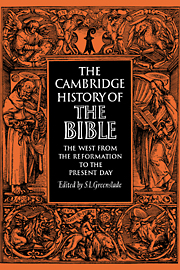Book contents
- Frontmatter
- Chapter I The Bible in the Reformation
- Chapter II Biblical Scholarship: Editions and Commentaries
- Chapter III Continental Versions to c. 1600
- Chapter IV English Versions of the Bible, 1525–1611
- Chapter V The Religion of Protestants
- Chapter VI The Bible in the Roman Catholic Church from Trent to the Present Day
- Chapter VII The Criticism and Theological Use of the Bible, 1700–1950
- Chapter VIII The Rise of Modern Biblical Scholarship and Recent Discussion of the Authority of the Bible
- Chapter IX Continental Versions from c. 1600 to the Present Day
- Chapter X English Versions since 1611
- Chapter XI The Bible and the Missionary
- Chapter XII The Printed Bible
- Chapter XIII Epilogue
- Appendices
- Bibliography
- Notes on the Plates
- Index
- Plate Section
- References
Chapter VIII - The Rise of Modern Biblical Scholarship and Recent Discussion of the Authority of the Bible
Published online by Cambridge University Press: 28 March 2008
- Frontmatter
- Chapter I The Bible in the Reformation
- Chapter II Biblical Scholarship: Editions and Commentaries
- Chapter III Continental Versions to c. 1600
- Chapter IV English Versions of the Bible, 1525–1611
- Chapter V The Religion of Protestants
- Chapter VI The Bible in the Roman Catholic Church from Trent to the Present Day
- Chapter VII The Criticism and Theological Use of the Bible, 1700–1950
- Chapter VIII The Rise of Modern Biblical Scholarship and Recent Discussion of the Authority of the Bible
- Chapter IX Continental Versions from c. 1600 to the Present Day
- Chapter X English Versions since 1611
- Chapter XI The Bible and the Missionary
- Chapter XII The Printed Bible
- Chapter XIII Epilogue
- Appendices
- Bibliography
- Notes on the Plates
- Index
- Plate Section
- References
Summary
The Rise of Modern Biblical Scholarship
During the century and a half in which modern methods of study have been applied to the task of biblical research the achievement of scholarship has been positive and immense. Inscriptions and documents contemporaneous with the biblical writings have been discovered; ancient languages can now be read whose existence was unknown or barely suspected by scholars a hundred years ago. It is today possible to compare biblical religious and social ideas and practices with those of other ancient peoples who lived alongside Israel and who influenced and were influenced by the development of Jewish and Christian thought and worship. Modern archaeological, philological and ‘history-of-religion’ methods have resulted in the accumulation of a mass of knowledge which illuminates every page of the Bible, while at the same time the development of the critical, literary and historical study of the biblical books themselves has brought about a complete revision of traditional notions about their relation to one another. It is impossible here to catalogue the results of these researches, but it is necessary to say something about their rise in the nineteenth century and their consequences both for biblical interpretation and for Christian theology in general in the twentieth. One thing has happened as a result of the rise of modern biblical research in the nineteenth century, and it affects every school of biblical interpretation in the western world today: it is no longer possible to ignore the discoveries of the scientific investigators, the archaeologists, philologists and workers in the sphere of the history of religion (loosely called ‘comparative religion’).
- Type
- Chapter
- Information
- The Cambridge History of the Bible , pp. 294 - 338Publisher: Cambridge University PressPrint publication year: 1963
References
- 1
- Cited by



